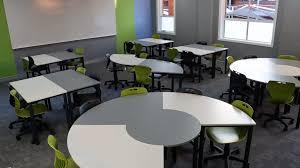When it comes to student health, much of the focus is placed on nutrition, physical activity, and mental well-being. However, an often-overlooked element is the school desk – a piece of furniture that plays a pivotal role in shaping students' physical health and academic experience. Poorly designed or inappropriate desks can lead to long-term health issues, while ergonomically sound desks can enhance comfort, focus, and learning outcomes.
The ımpact of desks on student health
Students spend a significant portion of their day seated at desks, making these tools essential for their well-being. Here are some key health aspects affected by school desks:
- Posture: Ill-fitting desks can cause students to slouch, twist, or lean, leading to poor posture. Over time, this can result in musculoskeletal issues, including back pain, neck strain, and spinal deformities.
- Eye health: Desks that are too low or too high can force students to maintain unnatural neck positions or strain their eyes while reading or writing, contributing to eye fatigue or myopia.
- Circulation: Prolonged sitting on poorly designed chairs can restrict blood flow, causing discomfort and even long-term circulatory issues.
- Mental focus: Uncomfortable desks can distract students from their lessons, reducing their concentration and academic performance.
Challenges in current school desk design
Many schools use traditional "one-size-fits-all" desks that fail to account for the diversity in student height, weight, and ergonomic needs. Other issues include:
- Lack of Adjustability: Fixed desks do not adapt to the growth of students, forcing younger or taller students into uncomfortable postures.
- Outdated Designs: Some schools still use desks with rigid surfaces and chairs, which lack lumbar support or cushioning.
- Insufficient Space: Narrow desks provide little room for books, notebooks, and other learning materials, creating a cluttered and stressful environment.
The solution: Ergonomic school desks
Ergonomic desks, designed to support the natural posture and movement of students, are a growing trend in modern classrooms. Here’s what they offer:
- Adjustability: Height-adjustable desks and chairs ensure that students of all sizes can maintain a proper sitting posture.
- Promoting movement: Standing desks or desks with flexible seating options, such as balance balls or wobble stools, encourage movement and reduce the risks associated with prolonged sitting.
- Supportive design: Ergonomic chairs with lumbar support and curved desks help align the spine and reduce strain on the back and neck.
- Adequate workspace: Spacious desks provide enough room for learning materials, reducing clutter and promoting better organization.
School policies and investments
Schools must recognize the importance of furniture in student health. Here are some steps that can be taken:
- Furniture audits: Periodically assess the condition and suitability of desks in classrooms.
- Gradual upgrades: Invest in ergonomic furniture incrementally, starting with younger grades where physical development is most critical.
- Student involvement: Involve students in selecting furniture to ensure it meets their comfort and learning needs.
- Educational campaigns: Teach students and teachers about proper sitting posture and desk ergonomics to maximize the benefits of existing furniture.
The broader benefits
Ergonomic desks do more than prevent health issues. They enhance learning by creating a comfortable and supportive environment, helping students stay focused and engaged. Additionally, schools that prioritize student well-being through such investments send a powerful message about the value they place on holistic education.
School desks are more than just furniture; they are tools that influence the physical and academic well-being of students. By transitioning to ergonomic and health-conscious designs, schools can prevent long-term health issues and foster a learning environment that supports growth, focus, and success. It's time to look beyond the surface and acknowledge the silent role of school desks in shaping healthier, brighter futures for students.
Bahman Huseyn
